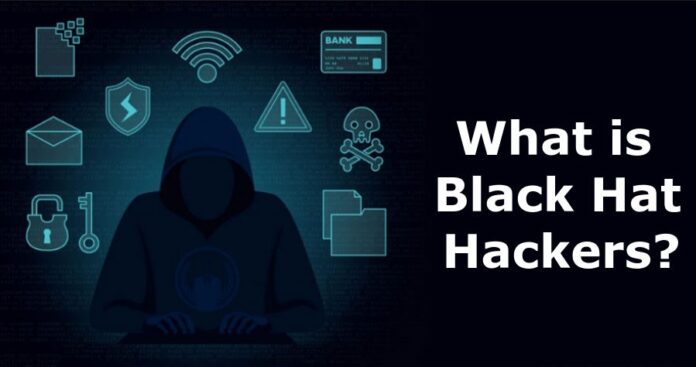Black Hat Hacker
Black hat hackers are often those that carry out cybercrime activities and employ hacking for financial benefit, cyber espionage, or other evil intentions, such as installing malware into computer systems.
If you follow the news and technological developments, you probably already know what a hacker is, but you might not be aware that there are three main types of hackers: Black Hat, White Hat, and Gray Hat. The words come from the color coding system used in 1950s westerns, when the good men wore white or other light colors while the evil guys wore black hats.
Black Hat hackers are crooks that intentionally breach computer networks. They could also disseminate malware that steals passwords, credit card numbers, and other private data, damages files, or seizes control of systems. Although governments may now use hacking extensively for information collection, Black Hats still frequently act alone or in concert with organized crime groups in search of quick cash. One such is the May 2017 emergence of the WannaCry ransomware. It infected almost 400,000 PCs in 150 countries in the first two weeks after its debut. Fortunately, security professionals quickly responded to WannaCry’s arrival by releasing decryption tools, which kept extortion payments to roughly $120,000 — or just more than 1% of the possible take.

Hacking is a business
Many Black Hat hackers began as inexperienced “script kids,” utilizing commercial hacker tools to take advantage of security flaws. Some were taught how to hack by bosses looking to earn quick cash. Black Hats in the highest echelons are typically adept hackers that work for sophisticated criminal organizations that occasionally offer communication tools to employees and service agreements to consumers, exactly like respectable businesses. Some Black Hat malware kits are even marketed with warranties and customer support on the Dark Web, the area of the internet that is purposefully hidden from search engines.
Black Hat hackers frequently specialize in tasks like administering remote access tools or phishing, which is not unexpected. Through forums and other links on the Dark Web, many people find their “work.” Like in the legal business sector, some people choose to create and sell harmful software independently, while others prefer to do so through franchises or leasing agreements. It is simple to spread harmful software since it is now treated as a large business. Businesses have partners, resellers, suppliers, and affiliates, and they purchase and sell malware licenses to other criminal enterprises for usage in new markets or locations.
Even some Black Hat companies have phone centers. One instance of how contact centers are utilized is the phone scam with a hacker posing as a Microsoft employee and calling to provide assistance. In this scam, the hackers tries to persuade potential victims to download software or grant remote access to their systems. When the victim permits access or installs the suggested software, it enables crooks to gather banking and password information or covertly take the computer’s control and use it to target other people. To further add salt to injury, the victim is sometimes assessed an outrageous cost for this “assistance.”
Numerous hacks are quick, automated, and devoid of human interaction. Attack bots browse the internet in these situations in search of vulnerable machines to infect. In one experiment, the BBC internet systems were assaulted in 71 minutes. In the same test, phishing attempts started arriving 21 hours after fake employee email addresses were created. 85 percent of those assaults had malware attachments, while the remaining 20 percent contained links to hacked websites.

Black Hats exist everywhere
Because Black Hat hacking is a worldwide issue, it is very challenging to put an end to it. For instance, four persons were detained in the UK as a consequence of the Microsoft phone fraud, but the calls were really made from India. That implies that the larger company is still operational.
Hackers frequently leave minimal evidence, exploit the computers of unknowing victims, and span various countries, which presents difficulties for law enforcement. The same operation may have several nodes in various countries, allowing the organization to operate throughout the clock, even though authorities may occasionally be successful in closing down a hacker site in one nation.
The greatest defense is being proactive by running reliable antivirus and antispyware programs, keeping your firewall on, and downloading and installing all OS (Operating System) updates as soon as they become available. To lessen your exposure to hackers, avoid downloading anything from untrusted sites, unplug your computer from the internet when not in use, and turn it off.

Well-known black hat hackers
A number of well-known black hat hackers have emerged in recent years, and their exploits have influenced many of the regulations that are in force today.

Kevin Mitnick
Mitnick was sentenced to jail for breaking into the computer network of the Digital Equipment Corporation in order to copy its software. His intrusion into the networks of Pacific Bell’s voicemail computers and other significant businesses led to his second high-profile arrest in 1995.
He was accused of offences including wire fraud, gaining access to a government computer without authorization, and harming a computer. He was incarcerated for five years.

Gonzalez, also identified as Segvec, was the mastermind of a significant cybercrime operation that gave rise to some of the largest data breaches in American history.
Gonzalez and other hackers from the ShadowCrew organization took involved in stealing and selling credit card account information from a number of merchants over a number of years, including The TJX Companies, BJ’s Wholesale Club, OfficeMax, Barnes & Noble, and Sports Authority.

Hector Xavier Monsegur
Monsegur, popularly known as Sabu, was a well-known participant in the online hacktivist organization Anonymous as well as a subgroup called LulzSec.
He and his linked organizations were in charge of taking part in internet assaults against various nations’ government computers as well as businesses including Visa, Mastercard, and Sony.
Monsegur was detained in 2011 and was facing up to 122 years in jail after being accused with various counts of computer hacking. He joined the Federal Bureau of Investigation (FBI) as an informant and helped the FBI apprehend further hackers. He was incarcerated for seven months.
Yahoo hackers
Two employees of the Russian intelligence agency Federal Security Service and two hired hackers were charged by the U.S. Department of Justice for hacking Yahoo in 2014 and collecting data from over 500 million user accounts. Authorities claim that the hack was done with the purpose of gathering intelligence and making money.
Canadian hacker Karim Baratov was the first to be detained. The second hacker, a native of Russia named Alexsey Belan, was well-known to American law enforcement.

The future of black hat hacking
Cybercrime and hacking in general are a global epidemic that are getting worse and more prevalent every year. In recent years, the number of data breaches alone has tended to increase yearly. There are many different types of cyberattacks, including phishing, social engineering, ransomware, firewall breaches, and denial-of-service assaults. The motives of malicious hackers might also differ. Some people want to set up software that will allow them to steal trade secrets or hold people for ransom. Some people want to steal information that can be used to steal identities or sold on the dark web. Others merely want to wreck havoc or interrupt services.


